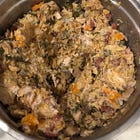Geniuses of the week
and we launched PUPKIN SPICE!
We are back at the social media content after a short break and set refresh for our favorite season…FALL! With every video comes new geniuses in the comments. This week we have some really good ones.
Before that, here’s our latest Fall recipes:
Also, we are happy to announce our new…






